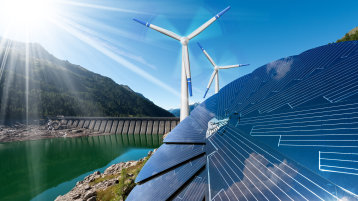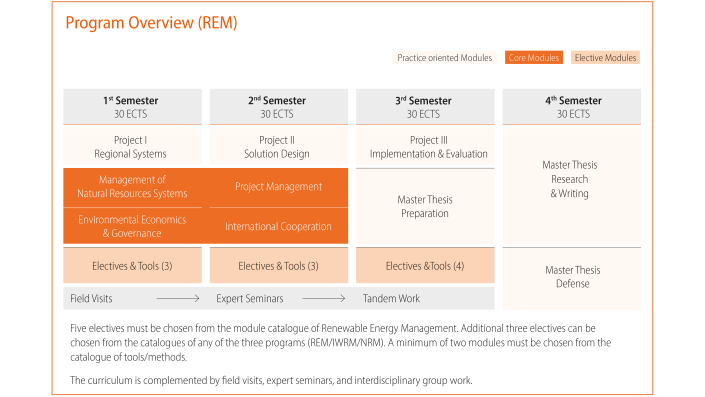Renewable Energy Management (Master's program) – Program Content

The overall objective of this Master's Program is to educate specialists for the management of energy resources and technologies – a global issue which needs a well trained workforce from the policy to practitioner level.
Focusing on countries in Africa, Asia and Latin America, the program emphasizes a holistic approach, considering both technical and socioeconomic aspects of energy management. Participants are provided with appropriate knowledge, methods and skills to analyze current problems in the field of renewable energy usage and related sectors. Ideal candidates for the program are recently graduated students or professionals with working experience in public or private institutions, authorities, or enterprises of the energy sector.
The applicants should be active in or dealing with energy and have an interest in learning and working in an intercultural and multidisciplinary environment.
Module Handbook
- Module Handbook Master's Programs (IWRM, NRM, REM) Here you will find all module contents of the Master's Programs
Semester Schedule
- Semester Schedule Master's Programs (IWRM, NRM, REM) Here you will find the semester schedule of the Master's Programs
Exam Schedule
- Exam Schedule Master's Programs (IWRM, NRM, REM) Here you will find the exam schedule of the Master's Programs
Program Structure
The studies cover a period of four semesters. From the first to third semester classes take place in Cologne. The program consists of core modules with the aim of providing an overview on renewable energy, economics, project management and the regional and institutional context. In addition, participants select electives related to specific topics of renewable energy management. The fourth semester focuses on the preparation of a master thesis. Internships and research stays, if possible together with a local institution or company, support the practical orientation of the research.
The master program starts in the winter term of each academic year. It consists of modules, which are usually block-structured. The program is equivalent to 120 ECTS, (one ECTS equals around 30 hours of workload) according to the European system.
Explanations of the contents and terms mentioned in the overview
Core Modules
Acknowledging the fact that participants have a wide range of professional backgrounds, core modules aim at providing the student with a general overview of different disciplines relevant to renewable energies. The REM program follows the principle of sustainable development, which can only be achieved in consideration of ethical and social aspects. Therefore, such aspects play a fundamental role during the studies. In various courses students are encouraged to think and reflect critically.
Elective Modules
The elective modules are organized into “Methods and Tools” and three thematic blocks: “Integrated Water Resources Management IWRM”, “Natural Resources Management and Development NRM” and “Renewable Energy Management REM”.
Students select a total of ten elective modules from the respective module catalogue REM (minimum 25 ECTS), the module catalogue Methods and Tools (minimum of 10 ECTS), and a maximum of 15 ECTS modules from the two module catalogues of the adjoining master programs (NRM and IWRM).
Such multiple opportunities of elective courses choices are beneficial for the interdisciplinary nature of the student body. Every student is supported in his way of specializing during the master program. Since resources management includes numerous cross-cutting issues, free choice of electives from the adjoining module catalogues related to land and water is highly important.
Thesis
The fourth semester is dedicated to the master thesis research which is addressing a present research or management problem. The thesis can be carried out in an African, Asian or Latin American country relevant to the student’s specialization, possibly a local institution or company guarantee the practical orientation of the master research. Here students demonstrate their ability to analyze a problem as well as design, execute and document the related research. Hence, the student applies the knowledge and competencies he/she acquired in the previous semesters and demonstrates the ability to plan and execute a project systematically and independently.
Field visits
Field visits play an important role as the exposure to real projects and to relevant institutions is of highest importance in order to meet the objectives of the master program.
Projects
In the Project modules students will have the chance to apply the new knowledge received in the basic or specialized modules to an interdisciplinary case study.
The participants should come from diverse technical or managerial backgrounds. The team projects should be related to real projects visited during the field trips or to projects suggested through other partners of the network.

